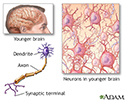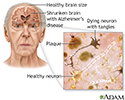Aging changes in the nervous system
The brain and nervous system are your body's central control center. They control your body's:
- Movements
- Senses
- Thoughts and memories
They also help control the organs such as your heart and bowels.
Nerves are the pathways that carry signals to and from your brain and the rest of your body. The spinal cord is the bundle of nerves that runs from your brain down the center of your back. Nerves extend out from the spinal cord to every part of your body.
AGING CHANGES AND THEIR EFFECTS ON THE NERVOUS SYSTEM
As you age, your brain and nervous system go through natural changes. Your brain and spinal cord lose nerve cells and weight (atrophy). Nerve cells may begin to pass messages more slowly than in the past. Waste products can collect in the brain tissue as nerve cells break down. This can cause abnormal changes in the brain called plaques and tangles to form. A fatty brown pigment ( lipofuscin ) can also build up in nerve tissue.
Lipofuscin
Lipofuscin is a brownish pigment left over from the breakdown and absorption of damaged blood cells. Lipofuscin is found in heart muscle and smooth m...

Breakdown of nerves can affect your senses. You might have reduced or lost reflexes or sensation. This leads to problems with movement and safety.
Slowing of thought, memory, and thinking is a normal part of aging. These changes are not the same in everyone. Some people have many changes in their nerves and brain tissue. Others have few changes. These changes are not always related to the effects on your ability to think.
NERVOUS SYSTEM PROBLEMS IN OLDER PEOPLE
Dementia and severe memory loss are not a normal part of aging. They can be caused by brain diseases such as Alzheimer disease , which doctors believe is associated with plaques and tangles forming in the brain and the buildup of lipofuscin.
Dementia
Dementia is a loss of brain function that occurs with certain diseases. It affects memory, thinking, language, judgment, and behavior.

Alzheimer disease
Dementia is a loss of brain function that occurs with certain diseases. Alzheimer disease is one form of dementia. It affects memory, thinking, and...

Delirium is sudden confusion that leads to changes in thinking and behavior. It is often due to illnesses that are not related to the brain. Infection can cause an older person to become severely confused. Certain medicines can also cause this.
Thinking and behavior problems can also be caused by poorly controlled diabetes . Rising and falling blood sugar levels can interfere with thought.
Diabetes
Diabetes is a chronic disease in which the body cannot regulate the amount of sugar in the blood.

Talk with your health care provider if you have any changes in:
- Memory
- Thought
- Ability to perform a task
Seek medical help right away if these symptoms occur suddenly or along with other symptoms. A change in thinking, memory, or behavior is important if it is different from your normal patterns or it affects your lifestyle.
PREVENTION
Mental and physical exercise can help your brain stay sharp. Mental exercises include:
- Reading
- Doing crossword puzzles
- Stimulating conversation
Physical exercise promotes blood flow to your brain. It also helps reduce loss of brain cells.
OTHER CHANGES
As you grow older, you will have other changes, including:
-
In organs, tissues, and cells
In organs, tissues, and cells
All vital organs begin to lose some function as you age during adulthood. Aging changes occur in all of the body's cells, tissues, and organs, and t...
 ImageRead Article Now Book Mark Article
ImageRead Article Now Book Mark Article -
In the heart and blood vessels
In the heart and blood vessels
Some changes in the heart and blood vessels normally occur with age. However, many other changes that are common with aging are due to modifiable fa...
 ImageRead Article Now Book Mark Article
ImageRead Article Now Book Mark Article -
In the vital signs
In the vital signs
Vital signs include body temperature, heart rate (pulse), breathing rate, and blood pressure. As you age, your vital signs may change, depending on ...
 ImageRead Article Now Book Mark Article
ImageRead Article Now Book Mark Article -
In the senses
In the senses
As you age, the way your senses (hearing, vision, taste, smell, touch) give you information about the world changes. Your senses become less sharp, ...
 ImageRead Article Now Book Mark Article
ImageRead Article Now Book Mark Article
References
Galvin JE. Neurologic signs in older adults. In: Fillit HM, Rockwood K, Young J, eds. Brocklehurst's Textbook of Geriatric Medicine and Gerontology . 8th ed. Philadelphia, PA: Elsevier; 2017:chap 18.
Khan BA, Boustani MA. Delirium. In: Ham RJ, Sloane PD, Warshaw GA, Potter JF, Flaherty E, eds. Ham's Primary Care Geriatrics . 6th ed. Philadelphia, PA: Elsevier Saunders; 2014:chap 16.
Khandelwal C, Kaufer DI. Alzheimer’s disease and other dementias. In: Ham RJ, Sloane PD, Warshaw GA, Potter JF, Flaherty E, eds. Ham's Primary Care Geriatrics . 6th ed. Philadelphia, PA: Elsevier Saunders; 2014:chap 17.
-
Brain and nervous system - illustration
The nervous system controls the many complicated and interconnected functions of the body and mind. Motor, sensory cognitive and autonomic function are all coordinated and driven by the brain and nerves. As people age, nerve cells deteriorated in number and facility, causing some lessening in function.
Brain and nervous system
illustration
-
Alzheimer's disease - illustration
Aged nervous tissue is less able to rapidly communicate with other neural tissues.
Alzheimer's disease
illustration
-
Brain and nervous system - illustration
The nervous system controls the many complicated and interconnected functions of the body and mind. Motor, sensory cognitive and autonomic function are all coordinated and driven by the brain and nerves. As people age, nerve cells deteriorated in number and facility, causing some lessening in function.
Brain and nervous system
illustration
-
Alzheimer's disease - illustration
Aged nervous tissue is less able to rapidly communicate with other neural tissues.
Alzheimer's disease
illustration
-
Skin wrinkles and blemishes
(In-Depth)
-
Stress
(In-Depth)
-
Insomnia
(Alt. Medicine)
-
Brain cancer
(Alt. Medicine)
-
Vitamins
(In-Depth)
-
Amyloidosis
(Alt. Medicine)
-
Obesity
(Alt. Medicine)
-
Menopause
(In-Depth)
-
Mind-body medicine
(Alt. Medicine)
-
Manganese
(Alt. Medicine)
Review Date: 8/22/2016
Reviewed By: Laura J. Martin, MD, MPH, ABIM Board Certified in Internal Medicine and Hospice and Palliative Medicine, Atlanta, GA. Also reviewed by David Zieve, MD, MHA, Isla Ogilvie, PhD, and the A.D.A.M. Editorial team.


